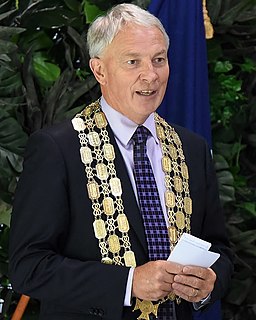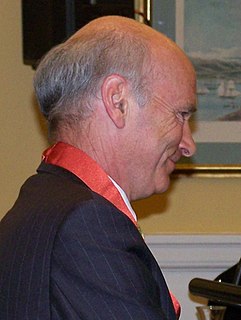
Genetically modified maize (corn) is a genetically modified crop. Specific maize strains have been genetically engineered to express agriculturally-desirable traits, including resistance to pests and to herbicides. Maize strains with both traits are now in use in multiple countries. GM maize has also caused controversy with respect to possible health effects, impact on other insects and impact on other plants via gene flow. One strain, called Starlink, was approved only for animal feed in the US but was found in food, leading to a series of recalls starting in 2000.

Michael Kenneth Moore was a New Zealand politician, union organiser, and author. In the Fourth Labour Government he served in several portfolios including minister of Foreign Affairs, and was the 34th prime minister of New Zealand for 59 days before the 1990 general election elected a new parliament. Following Labour's defeat in that election, Moore served as Leader of the Opposition until the 1993 election, after which Helen Clark successfully challenged him for the Labour Party leadership.

Donald Thomas Brash is a former New Zealand politician who was Leader of the Opposition and Leader of the New Zealand National Party from October 2003 to November 2006, and the Leader of ACT New Zealand from April to November 2011.

The 2002 New Zealand general election was held on 27 July 2002 to determine the composition of the 47th New Zealand Parliament. It saw the reelection of Helen Clark's Labour Party government, as well as the worst-ever performance by the opposition National Party in terms of seats won, the 2020 election would see it suffer a greater defeat in terms of net loss of seats.

Philip Bruce Goff is a New Zealand politician who has been the Mayor of Auckland since 2016. Previously, he was a Member of the New Zealand Parliament from 1981 to 1990 and again from 1993 to 2016. He served as Leader of the Labour Party and Leader of the Opposition between 11 November 2008 and 13 December 2011.

Nicky Hager is a New Zealand investigative journalist. He has produced seven books since 1996, covering topics such as intelligence networks, environmental issues and politics. He is one of two New Zealand members of the International Consortium of Investigative Journalists.

David William Parker is a New Zealand Labour Party politician who currently serves as Attorney-General, Minister for the Environment, Minister of Oceans and Fisheries, Minister of Revenue and Associate Minister of Finance in the Sixth Labour Government. He previously served as a Cabinet Minister in the Fifth Labour Government and as interim Leader of the Labour Party from September to November 2014. He represented the Otago electorate at the 47th Parliament and has since served as a list MP.

John James Campbell is a New Zealand journalist and radio and television personality. He is currently a presenter and reporter at TVNZ; before that, he presented Checkpoint, Radio New Zealand's drive time show, from 2016 to 2018. For ten years prior to that, he presented Campbell Live, a 7 p.m. current affairs programme on TV3. He was a rugby commentator for Sky Sports during the All Blacks' test against Samoa in early 2015 — a fixture he had vocally campaigned for while hosting Campbell Live.
The 2005 New Zealand election funding controversy occurred in the aftermath of the 2005 New Zealand general election.

Mark Prebble is a former New Zealand civil servant. He was the State Services Commissioner, head of New Zealand's public service from May 2004 until 30 June 2008. On 25 January 2008, Prebble announced his retirement after 32 years in the Public Service.

Genetically modified food controversies are disputes over the use of foods and other goods derived from genetically modified crops instead of conventional crops, and other uses of genetic engineering in food production. The disputes involve consumers, farmers, biotechnology companies, governmental regulators, non-governmental organizations, and scientists. The key areas of controversy related to genetically modified food are whether such food should be labeled, the role of government regulators, the objectivity of scientific research and publication, the effect of genetically modified crops on health and the environment, the effect on pesticide resistance, the impact of such crops for farmers, and the role of the crops in feeding the world population. In addition, products derived from GMO organisms play a role in the production of ethanol fuels and pharmaceuticals.

The Fifth Labour Government of New Zealand was the government of New Zealand from 10 December 1999 to 19 November 2008. Labour Party leader Helen Clark negotiated a coalition with Jim Anderton, leader of the Alliance Party. While undertaking a number of substantial reforms, it was not particularly radical compared to previous Labour governments.
Genetic pollution is a controversial term for uncontrolled gene flow into wild populations. It is defined as "the dispersal of contaminated altered genes from genetically engineered organisms to natural organisms, esp. by cross-pollination", but has come to be used in some broader ways. It is related to the population genetics concept of gene flow, and genetic rescue, which is genetic material intentionally introduced to increase the fitness of a population. It is called genetic pollution when it negatively impacts on the fitness of a population, such as through outbreeding depression and the introduction of unwanted phenotypes which can lead to extinction.

Grant Murray Robertson is a New Zealand politician and member of the Labour Party who has served as the 19th deputy prime minister of New Zealand since 2020 and the minister of Finance since 2017. He has served as Member of Parliament (MP) for Wellington Central since 2008.

The 2009 Mount Albert by-election was held in the New Zealand electorate of Mount Albert on 13 June 2009. There were fifteen candidates in the election. David Shearer of the Labour Party won the election with 63% of the vote. The seat was vacated by former Labour Prime Minister Helen Clark, who resigned from the New Zealand Parliament on 17 April 2009 following her appointment to head the United Nations Development Programme. Main issues surrounding the campaign included the building of the Waterview Connection and the Auckland Region becoming a supercity.

Helen Elizabeth Clark is a New Zealand politician who served as the 37th prime minister of New Zealand from 1999 to 2008, and was the administrator of the United Nations Development Programme from 2009 to 2017. She was New Zealand's fifth-longest-serving prime minister, and the second woman to hold that office.
The Center for Food Safety (CFS) is a 501c3, U.S. non-profit advocacy organization, based in Washington, D.C. It maintains an office in San Francisco, California. The executive director is Andrew Kimbrell, an attorney. Its stated mission is to protect human health and the environment, focusing on food production technologies such as genetically modified plants and organisms (GMOs). It was founded in 1997.

Dirty Politics: How attack politics is poisoning New Zealand’s political environment is a book by Nicky Hager published in August 2014.
This article discusses topics relating to genetic engineering within Oceania. Currently New Zealand and Australia require labeling so consumers can exercise choice between foods that have genetically modified, conventional, or organic origins.














